BMP3004 World of Work Report: Functional Areas and Employee Skills
VerifiedAdded on 2022/12/14
|8
|2013
|205
Report
AI Summary
This report provides a detailed overview of functional areas in business organizations, including personnel management, financial management, and marketing management. It examines the roles and responsibilities within each area, highlighting their importance for organizational success. The report also explores the types of skills needed by employees to work effectively in these functional areas, such as communication, decision-making, and flexibility. The analysis emphasizes the significance of these skills for achieving business objectives and adapting to various work environments. The report is designed to inform and educate readers on the interconnectedness of functional areas and the essential skills required for employees to contribute effectively to organizational goals.

Functional Areas
Paraphrase This Document
Need a fresh take? Get an instant paraphrase of this document with our AI Paraphraser
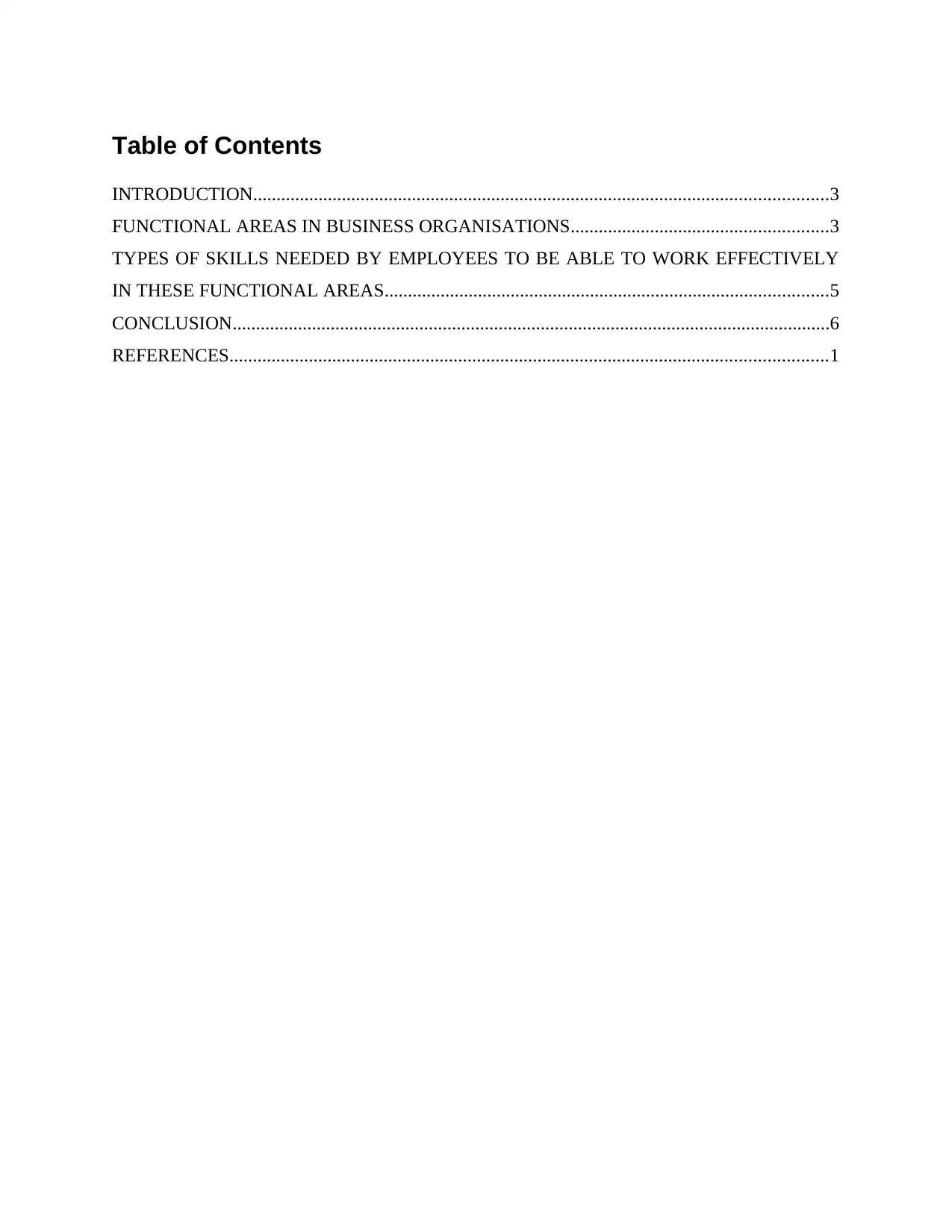
Table of Contents
INTRODUCTION...........................................................................................................................3
FUNCTIONAL AREAS IN BUSINESS ORGANISATIONS.......................................................3
TYPES OF SKILLS NEEDED BY EMPLOYEES TO BE ABLE TO WORK EFFECTIVELY
IN THESE FUNCTIONAL AREAS...............................................................................................5
CONCLUSION................................................................................................................................6
REFERENCES................................................................................................................................1
INTRODUCTION...........................................................................................................................3
FUNCTIONAL AREAS IN BUSINESS ORGANISATIONS.......................................................3
TYPES OF SKILLS NEEDED BY EMPLOYEES TO BE ABLE TO WORK EFFECTIVELY
IN THESE FUNCTIONAL AREAS...............................................................................................5
CONCLUSION................................................................................................................................6
REFERENCES................................................................................................................................1
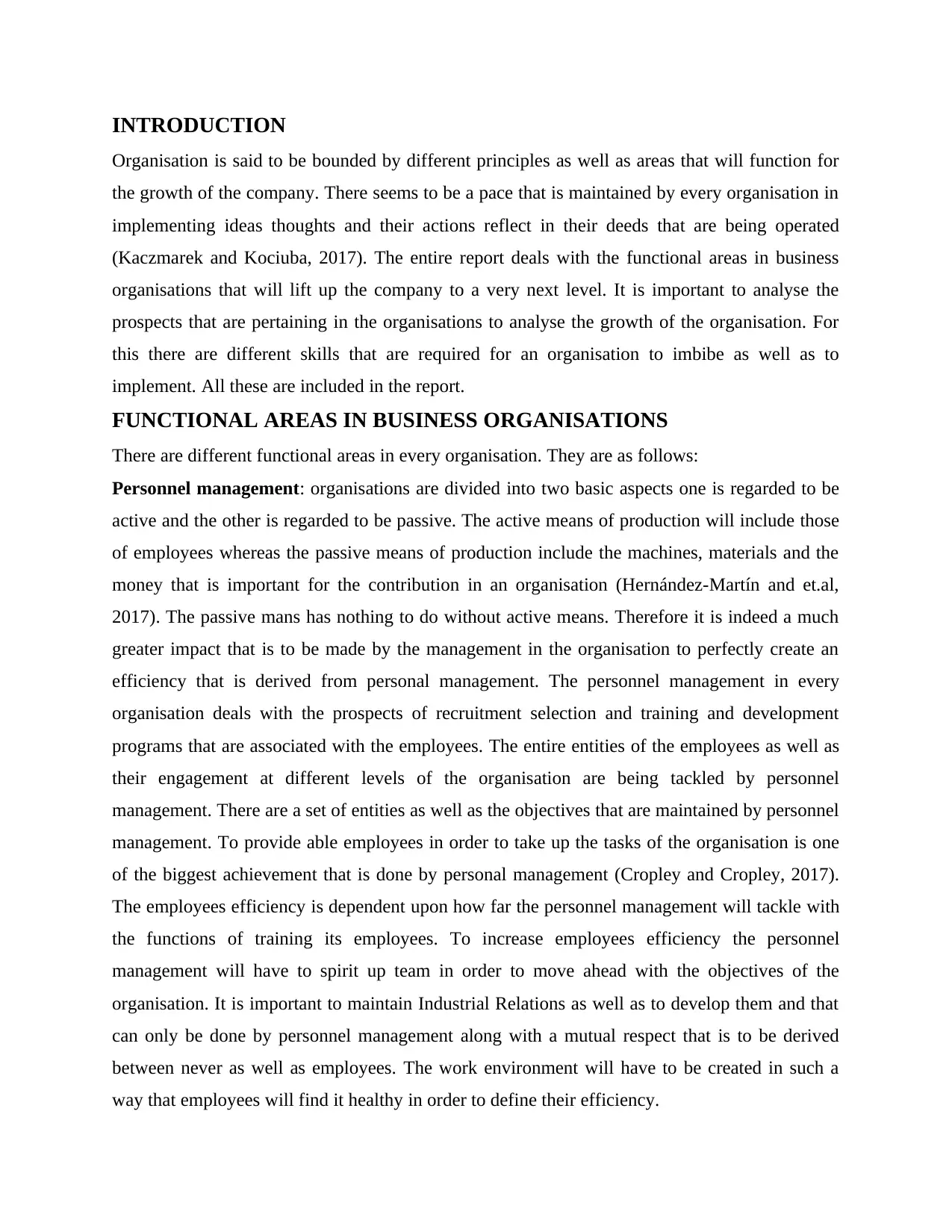
INTRODUCTION
Organisation is said to be bounded by different principles as well as areas that will function for
the growth of the company. There seems to be a pace that is maintained by every organisation in
implementing ideas thoughts and their actions reflect in their deeds that are being operated
(Kaczmarek and Kociuba, 2017). The entire report deals with the functional areas in business
organisations that will lift up the company to a very next level. It is important to analyse the
prospects that are pertaining in the organisations to analyse the growth of the organisation. For
this there are different skills that are required for an organisation to imbibe as well as to
implement. All these are included in the report.
FUNCTIONAL AREAS IN BUSINESS ORGANISATIONS
There are different functional areas in every organisation. They are as follows:
Personnel management: organisations are divided into two basic aspects one is regarded to be
active and the other is regarded to be passive. The active means of production will include those
of employees whereas the passive means of production include the machines, materials and the
money that is important for the contribution in an organisation (Hernández-Martín and et.al,
2017). The passive mans has nothing to do without active means. Therefore it is indeed a much
greater impact that is to be made by the management in the organisation to perfectly create an
efficiency that is derived from personal management. The personnel management in every
organisation deals with the prospects of recruitment selection and training and development
programs that are associated with the employees. The entire entities of the employees as well as
their engagement at different levels of the organisation are being tackled by personnel
management. There are a set of entities as well as the objectives that are maintained by personnel
management. To provide able employees in order to take up the tasks of the organisation is one
of the biggest achievement that is done by personal management (Cropley and Cropley, 2017).
The employees efficiency is dependent upon how far the personnel management will tackle with
the functions of training its employees. To increase employees efficiency the personnel
management will have to spirit up team in order to move ahead with the objectives of the
organisation. It is important to maintain Industrial Relations as well as to develop them and that
can only be done by personnel management along with a mutual respect that is to be derived
between never as well as employees. The work environment will have to be created in such a
way that employees will find it healthy in order to define their efficiency.
Organisation is said to be bounded by different principles as well as areas that will function for
the growth of the company. There seems to be a pace that is maintained by every organisation in
implementing ideas thoughts and their actions reflect in their deeds that are being operated
(Kaczmarek and Kociuba, 2017). The entire report deals with the functional areas in business
organisations that will lift up the company to a very next level. It is important to analyse the
prospects that are pertaining in the organisations to analyse the growth of the organisation. For
this there are different skills that are required for an organisation to imbibe as well as to
implement. All these are included in the report.
FUNCTIONAL AREAS IN BUSINESS ORGANISATIONS
There are different functional areas in every organisation. They are as follows:
Personnel management: organisations are divided into two basic aspects one is regarded to be
active and the other is regarded to be passive. The active means of production will include those
of employees whereas the passive means of production include the machines, materials and the
money that is important for the contribution in an organisation (Hernández-Martín and et.al,
2017). The passive mans has nothing to do without active means. Therefore it is indeed a much
greater impact that is to be made by the management in the organisation to perfectly create an
efficiency that is derived from personal management. The personnel management in every
organisation deals with the prospects of recruitment selection and training and development
programs that are associated with the employees. The entire entities of the employees as well as
their engagement at different levels of the organisation are being tackled by personnel
management. There are a set of entities as well as the objectives that are maintained by personnel
management. To provide able employees in order to take up the tasks of the organisation is one
of the biggest achievement that is done by personal management (Cropley and Cropley, 2017).
The employees efficiency is dependent upon how far the personnel management will tackle with
the functions of training its employees. To increase employees efficiency the personnel
management will have to spirit up team in order to move ahead with the objectives of the
organisation. It is important to maintain Industrial Relations as well as to develop them and that
can only be done by personnel management along with a mutual respect that is to be derived
between never as well as employees. The work environment will have to be created in such a
way that employees will find it healthy in order to define their efficiency.
⊘ This is a preview!⊘
Do you want full access?
Subscribe today to unlock all pages.

Trusted by 1+ million students worldwide
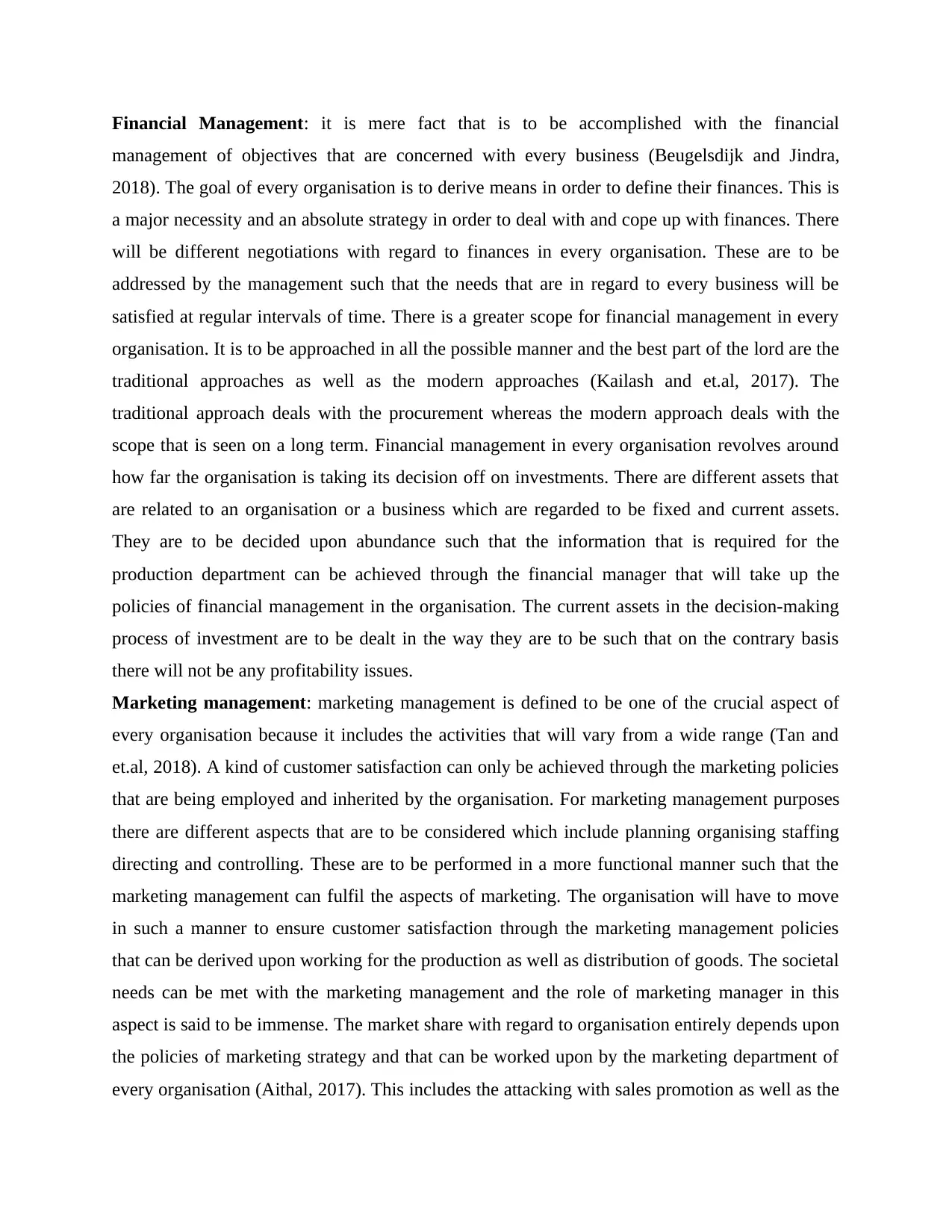
Financial Management: it is mere fact that is to be accomplished with the financial
management of objectives that are concerned with every business (Beugelsdijk and Jindra,
2018). The goal of every organisation is to derive means in order to define their finances. This is
a major necessity and an absolute strategy in order to deal with and cope up with finances. There
will be different negotiations with regard to finances in every organisation. These are to be
addressed by the management such that the needs that are in regard to every business will be
satisfied at regular intervals of time. There is a greater scope for financial management in every
organisation. It is to be approached in all the possible manner and the best part of the lord are the
traditional approaches as well as the modern approaches (Kailash and et.al, 2017). The
traditional approach deals with the procurement whereas the modern approach deals with the
scope that is seen on a long term. Financial management in every organisation revolves around
how far the organisation is taking its decision off on investments. There are different assets that
are related to an organisation or a business which are regarded to be fixed and current assets.
They are to be decided upon abundance such that the information that is required for the
production department can be achieved through the financial manager that will take up the
policies of financial management in the organisation. The current assets in the decision-making
process of investment are to be dealt in the way they are to be such that on the contrary basis
there will not be any profitability issues.
Marketing management: marketing management is defined to be one of the crucial aspect of
every organisation because it includes the activities that will vary from a wide range (Tan and
et.al, 2018). A kind of customer satisfaction can only be achieved through the marketing policies
that are being employed and inherited by the organisation. For marketing management purposes
there are different aspects that are to be considered which include planning organising staffing
directing and controlling. These are to be performed in a more functional manner such that the
marketing management can fulfil the aspects of marketing. The organisation will have to move
in such a manner to ensure customer satisfaction through the marketing management policies
that can be derived upon working for the production as well as distribution of goods. The societal
needs can be met with the marketing management and the role of marketing manager in this
aspect is said to be immense. The market share with regard to organisation entirely depends upon
the policies of marketing strategy and that can be worked upon by the marketing department of
every organisation (Aithal, 2017). This includes the attacking with sales promotion as well as the
management of objectives that are concerned with every business (Beugelsdijk and Jindra,
2018). The goal of every organisation is to derive means in order to define their finances. This is
a major necessity and an absolute strategy in order to deal with and cope up with finances. There
will be different negotiations with regard to finances in every organisation. These are to be
addressed by the management such that the needs that are in regard to every business will be
satisfied at regular intervals of time. There is a greater scope for financial management in every
organisation. It is to be approached in all the possible manner and the best part of the lord are the
traditional approaches as well as the modern approaches (Kailash and et.al, 2017). The
traditional approach deals with the procurement whereas the modern approach deals with the
scope that is seen on a long term. Financial management in every organisation revolves around
how far the organisation is taking its decision off on investments. There are different assets that
are related to an organisation or a business which are regarded to be fixed and current assets.
They are to be decided upon abundance such that the information that is required for the
production department can be achieved through the financial manager that will take up the
policies of financial management in the organisation. The current assets in the decision-making
process of investment are to be dealt in the way they are to be such that on the contrary basis
there will not be any profitability issues.
Marketing management: marketing management is defined to be one of the crucial aspect of
every organisation because it includes the activities that will vary from a wide range (Tan and
et.al, 2018). A kind of customer satisfaction can only be achieved through the marketing policies
that are being employed and inherited by the organisation. For marketing management purposes
there are different aspects that are to be considered which include planning organising staffing
directing and controlling. These are to be performed in a more functional manner such that the
marketing management can fulfil the aspects of marketing. The organisation will have to move
in such a manner to ensure customer satisfaction through the marketing management policies
that can be derived upon working for the production as well as distribution of goods. The societal
needs can be met with the marketing management and the role of marketing manager in this
aspect is said to be immense. The market share with regard to organisation entirely depends upon
the policies of marketing strategy and that can be worked upon by the marketing department of
every organisation (Aithal, 2017). This includes the attacking with sales promotion as well as the
Paraphrase This Document
Need a fresh take? Get an instant paraphrase of this document with our AI Paraphraser
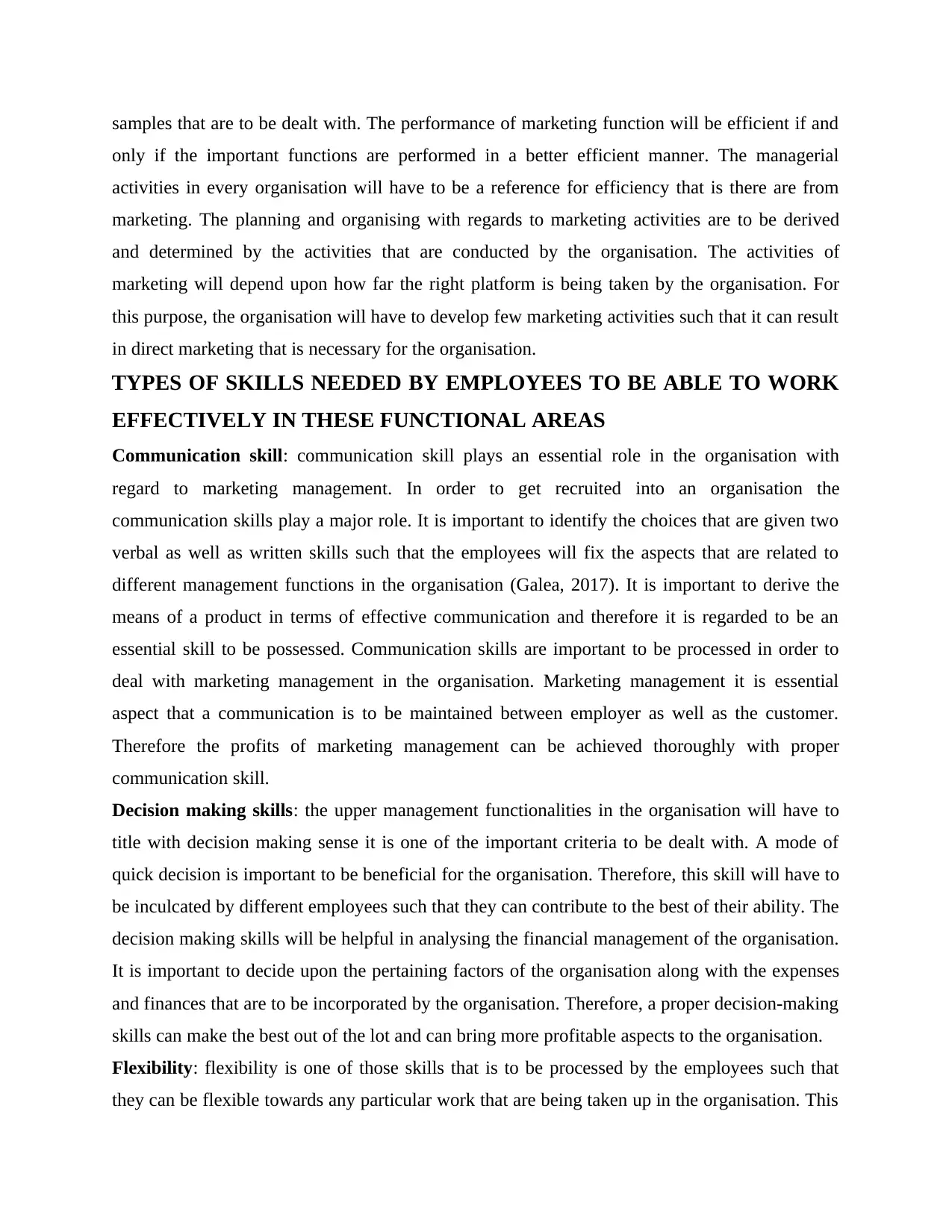
samples that are to be dealt with. The performance of marketing function will be efficient if and
only if the important functions are performed in a better efficient manner. The managerial
activities in every organisation will have to be a reference for efficiency that is there are from
marketing. The planning and organising with regards to marketing activities are to be derived
and determined by the activities that are conducted by the organisation. The activities of
marketing will depend upon how far the right platform is being taken by the organisation. For
this purpose, the organisation will have to develop few marketing activities such that it can result
in direct marketing that is necessary for the organisation.
TYPES OF SKILLS NEEDED BY EMPLOYEES TO BE ABLE TO WORK
EFFECTIVELY IN THESE FUNCTIONAL AREAS
Communication skill: communication skill plays an essential role in the organisation with
regard to marketing management. In order to get recruited into an organisation the
communication skills play a major role. It is important to identify the choices that are given two
verbal as well as written skills such that the employees will fix the aspects that are related to
different management functions in the organisation (Galea, 2017). It is important to derive the
means of a product in terms of effective communication and therefore it is regarded to be an
essential skill to be possessed. Communication skills are important to be processed in order to
deal with marketing management in the organisation. Marketing management it is essential
aspect that a communication is to be maintained between employer as well as the customer.
Therefore the profits of marketing management can be achieved thoroughly with proper
communication skill.
Decision making skills: the upper management functionalities in the organisation will have to
title with decision making sense it is one of the important criteria to be dealt with. A mode of
quick decision is important to be beneficial for the organisation. Therefore, this skill will have to
be inculcated by different employees such that they can contribute to the best of their ability. The
decision making skills will be helpful in analysing the financial management of the organisation.
It is important to decide upon the pertaining factors of the organisation along with the expenses
and finances that are to be incorporated by the organisation. Therefore, a proper decision-making
skills can make the best out of the lot and can bring more profitable aspects to the organisation.
Flexibility: flexibility is one of those skills that is to be processed by the employees such that
they can be flexible towards any particular work that are being taken up in the organisation. This
only if the important functions are performed in a better efficient manner. The managerial
activities in every organisation will have to be a reference for efficiency that is there are from
marketing. The planning and organising with regards to marketing activities are to be derived
and determined by the activities that are conducted by the organisation. The activities of
marketing will depend upon how far the right platform is being taken by the organisation. For
this purpose, the organisation will have to develop few marketing activities such that it can result
in direct marketing that is necessary for the organisation.
TYPES OF SKILLS NEEDED BY EMPLOYEES TO BE ABLE TO WORK
EFFECTIVELY IN THESE FUNCTIONAL AREAS
Communication skill: communication skill plays an essential role in the organisation with
regard to marketing management. In order to get recruited into an organisation the
communication skills play a major role. It is important to identify the choices that are given two
verbal as well as written skills such that the employees will fix the aspects that are related to
different management functions in the organisation (Galea, 2017). It is important to derive the
means of a product in terms of effective communication and therefore it is regarded to be an
essential skill to be possessed. Communication skills are important to be processed in order to
deal with marketing management in the organisation. Marketing management it is essential
aspect that a communication is to be maintained between employer as well as the customer.
Therefore the profits of marketing management can be achieved thoroughly with proper
communication skill.
Decision making skills: the upper management functionalities in the organisation will have to
title with decision making sense it is one of the important criteria to be dealt with. A mode of
quick decision is important to be beneficial for the organisation. Therefore, this skill will have to
be inculcated by different employees such that they can contribute to the best of their ability. The
decision making skills will be helpful in analysing the financial management of the organisation.
It is important to decide upon the pertaining factors of the organisation along with the expenses
and finances that are to be incorporated by the organisation. Therefore, a proper decision-making
skills can make the best out of the lot and can bring more profitable aspects to the organisation.
Flexibility: flexibility is one of those skills that is to be processed by the employees such that
they can be flexible towards any particular work that are being taken up in the organisation. This
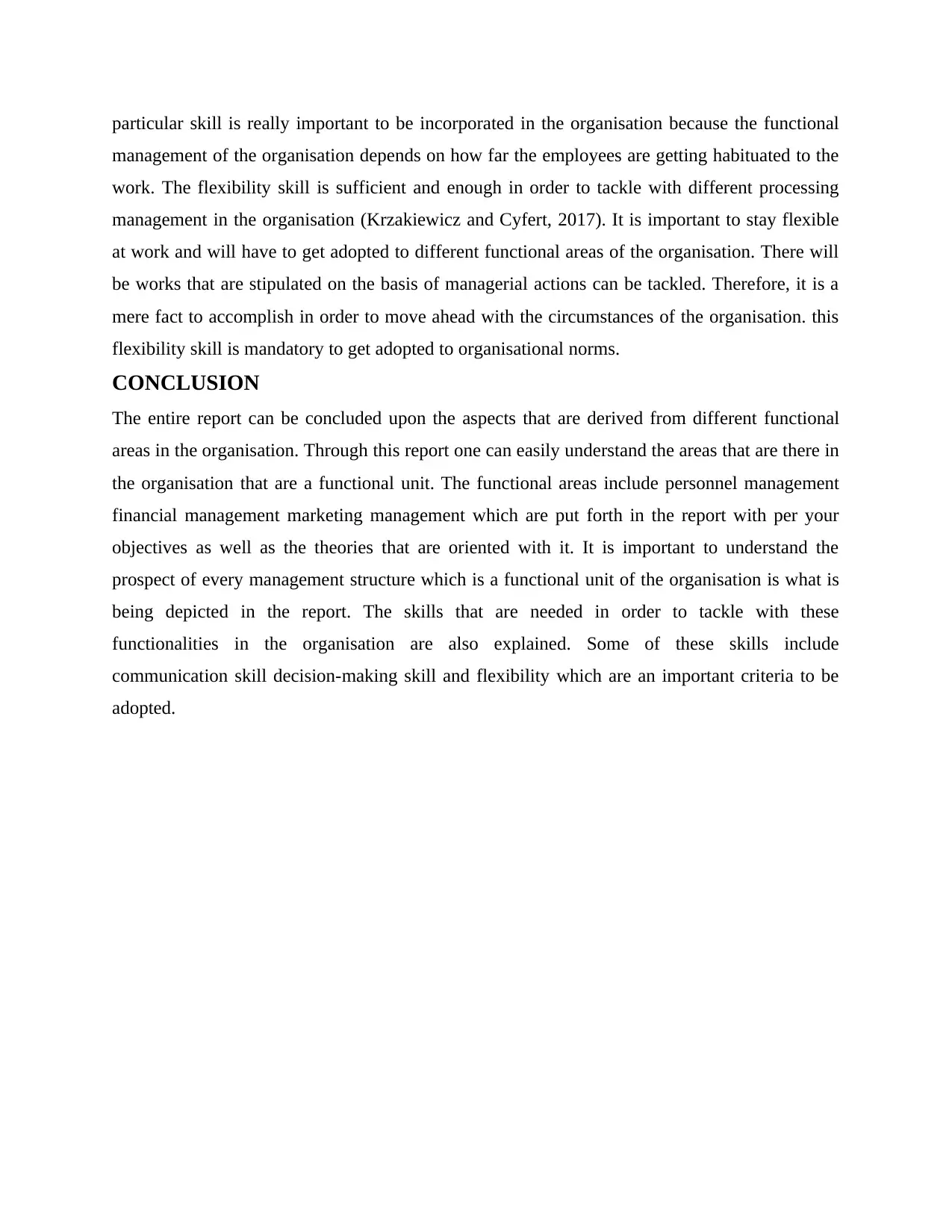
particular skill is really important to be incorporated in the organisation because the functional
management of the organisation depends on how far the employees are getting habituated to the
work. The flexibility skill is sufficient and enough in order to tackle with different processing
management in the organisation (Krzakiewicz and Cyfert, 2017). It is important to stay flexible
at work and will have to get adopted to different functional areas of the organisation. There will
be works that are stipulated on the basis of managerial actions can be tackled. Therefore, it is a
mere fact to accomplish in order to move ahead with the circumstances of the organisation. this
flexibility skill is mandatory to get adopted to organisational norms.
CONCLUSION
The entire report can be concluded upon the aspects that are derived from different functional
areas in the organisation. Through this report one can easily understand the areas that are there in
the organisation that are a functional unit. The functional areas include personnel management
financial management marketing management which are put forth in the report with per your
objectives as well as the theories that are oriented with it. It is important to understand the
prospect of every management structure which is a functional unit of the organisation is what is
being depicted in the report. The skills that are needed in order to tackle with these
functionalities in the organisation are also explained. Some of these skills include
communication skill decision-making skill and flexibility which are an important criteria to be
adopted.
management of the organisation depends on how far the employees are getting habituated to the
work. The flexibility skill is sufficient and enough in order to tackle with different processing
management in the organisation (Krzakiewicz and Cyfert, 2017). It is important to stay flexible
at work and will have to get adopted to different functional areas of the organisation. There will
be works that are stipulated on the basis of managerial actions can be tackled. Therefore, it is a
mere fact to accomplish in order to move ahead with the circumstances of the organisation. this
flexibility skill is mandatory to get adopted to organisational norms.
CONCLUSION
The entire report can be concluded upon the aspects that are derived from different functional
areas in the organisation. Through this report one can easily understand the areas that are there in
the organisation that are a functional unit. The functional areas include personnel management
financial management marketing management which are put forth in the report with per your
objectives as well as the theories that are oriented with it. It is important to understand the
prospect of every management structure which is a functional unit of the organisation is what is
being depicted in the report. The skills that are needed in order to tackle with these
functionalities in the organisation are also explained. Some of these skills include
communication skill decision-making skill and flexibility which are an important criteria to be
adopted.
⊘ This is a preview!⊘
Do you want full access?
Subscribe today to unlock all pages.

Trusted by 1+ million students worldwide
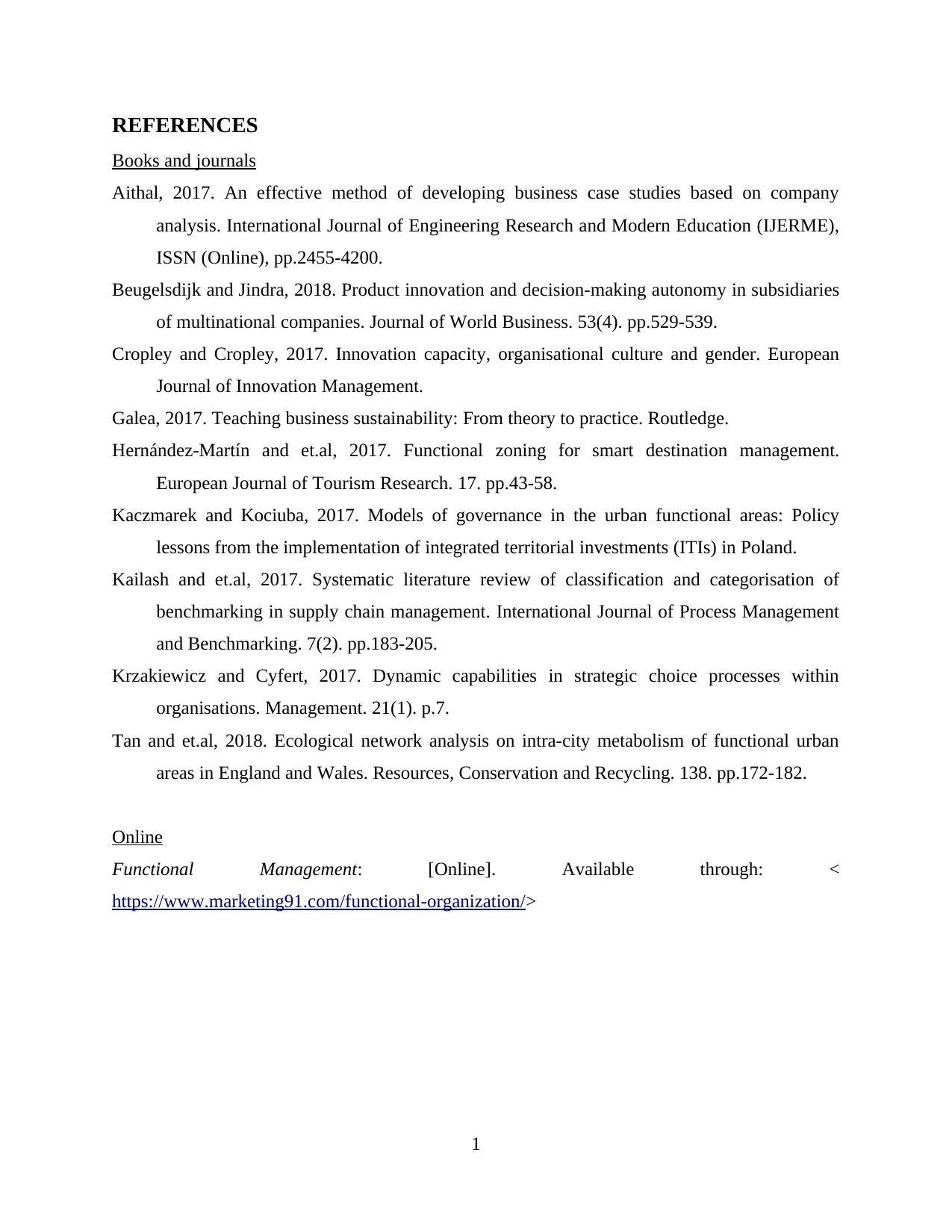
REFERENCES
Books and journals
Aithal, 2017. An effective method of developing business case studies based on company
analysis. International Journal of Engineering Research and Modern Education (IJERME),
ISSN (Online), pp.2455-4200.
Beugelsdijk and Jindra, 2018. Product innovation and decision-making autonomy in subsidiaries
of multinational companies. Journal of World Business. 53(4). pp.529-539.
Cropley and Cropley, 2017. Innovation capacity, organisational culture and gender. European
Journal of Innovation Management.
Galea, 2017. Teaching business sustainability: From theory to practice. Routledge.
Hernández-Martín and et.al, 2017. Functional zoning for smart destination management.
European Journal of Tourism Research. 17. pp.43-58.
Kaczmarek and Kociuba, 2017. Models of governance in the urban functional areas: Policy
lessons from the implementation of integrated territorial investments (ITIs) in Poland.
Kailash and et.al, 2017. Systematic literature review of classification and categorisation of
benchmarking in supply chain management. International Journal of Process Management
and Benchmarking. 7(2). pp.183-205.
Krzakiewicz and Cyfert, 2017. Dynamic capabilities in strategic choice processes within
organisations. Management. 21(1). p.7.
Tan and et.al, 2018. Ecological network analysis on intra-city metabolism of functional urban
areas in England and Wales. Resources, Conservation and Recycling. 138. pp.172-182.
Online
Functional Management: [Online]. Available through: <
https://www.marketing91.com/functional-organization/>
1
Books and journals
Aithal, 2017. An effective method of developing business case studies based on company
analysis. International Journal of Engineering Research and Modern Education (IJERME),
ISSN (Online), pp.2455-4200.
Beugelsdijk and Jindra, 2018. Product innovation and decision-making autonomy in subsidiaries
of multinational companies. Journal of World Business. 53(4). pp.529-539.
Cropley and Cropley, 2017. Innovation capacity, organisational culture and gender. European
Journal of Innovation Management.
Galea, 2017. Teaching business sustainability: From theory to practice. Routledge.
Hernández-Martín and et.al, 2017. Functional zoning for smart destination management.
European Journal of Tourism Research. 17. pp.43-58.
Kaczmarek and Kociuba, 2017. Models of governance in the urban functional areas: Policy
lessons from the implementation of integrated territorial investments (ITIs) in Poland.
Kailash and et.al, 2017. Systematic literature review of classification and categorisation of
benchmarking in supply chain management. International Journal of Process Management
and Benchmarking. 7(2). pp.183-205.
Krzakiewicz and Cyfert, 2017. Dynamic capabilities in strategic choice processes within
organisations. Management. 21(1). p.7.
Tan and et.al, 2018. Ecological network analysis on intra-city metabolism of functional urban
areas in England and Wales. Resources, Conservation and Recycling. 138. pp.172-182.
Online
Functional Management: [Online]. Available through: <
https://www.marketing91.com/functional-organization/>
1
Paraphrase This Document
Need a fresh take? Get an instant paraphrase of this document with our AI Paraphraser

2
1 out of 8
Related Documents
Your All-in-One AI-Powered Toolkit for Academic Success.
+13062052269
info@desklib.com
Available 24*7 on WhatsApp / Email
![[object Object]](/_next/static/media/star-bottom.7253800d.svg)
Unlock your academic potential
Copyright © 2020–2025 A2Z Services. All Rights Reserved. Developed and managed by ZUCOL.





